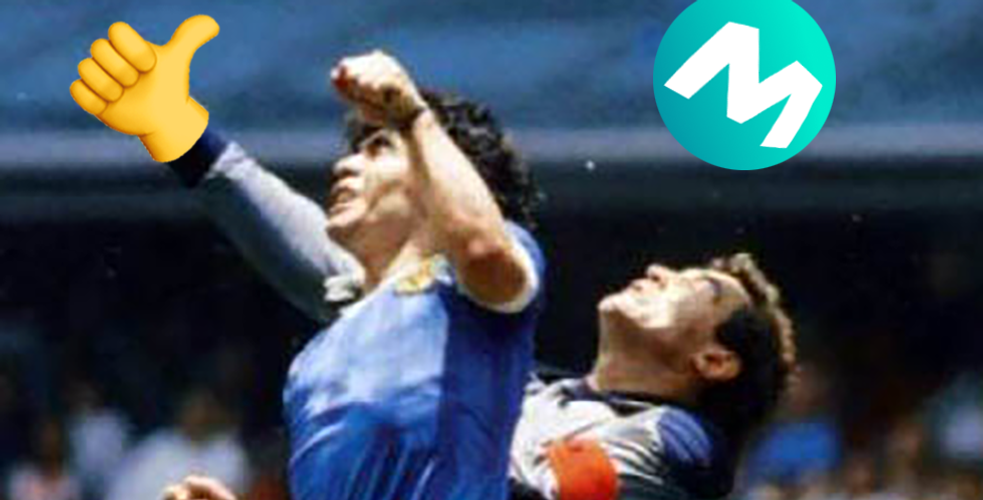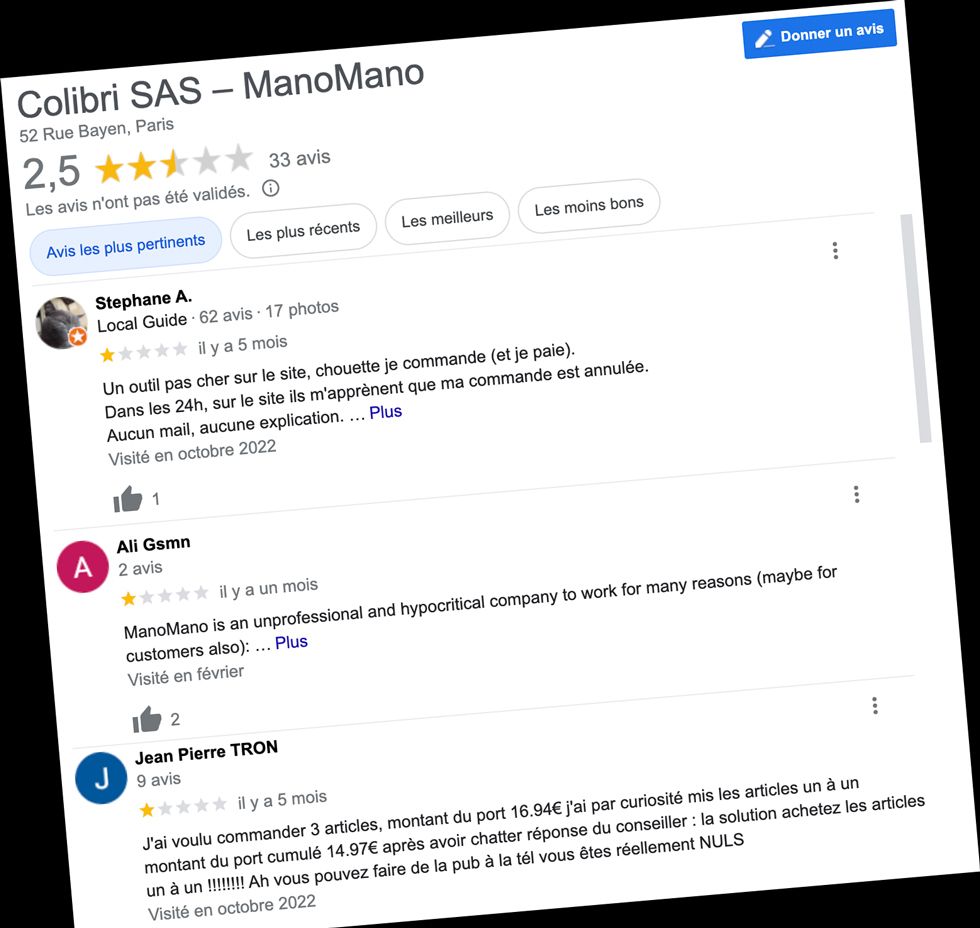Fake helpers and Manodvisors : does ManoMano tamper with its customer reviews?

Are the recommendations of “Manodvisors” reliable and independent? The answer will be in the next issue of En-Contact magazine (#128). Meanwhile, here's a preview of the first elements of the investigation.
In an article dated April 7 ("Des avis pas réglos sur ManoMano" - Unclear reviews on ManoMano), the French consumer magazine, 60 Millions de Consommateurs, agrees with our observations: the largest marketplace in Europe dedicated to DIY, the company ManoMano, controls its customer reviews very tightly and has an army of “Manodvisors” working to provide biased advice to prospective customers. Just as Magali Berdah did in her heyday, with the world of beauty and influencers, ManoMano seems to be fiddling with its recommendations. Is this true? Is it legal?
Where do we draw the line on deceptive business practices? “The commercial practice of issuing false reviews on the internet or modifying real reviews is now considered unfair. Professionals face two years' imprisonment and a €300,000 fine if they violate this provision.” A little research on the various independent customer review sites and forums reveals that many consumers and customers of ManoMano are disappointed and surprised: "Catastrophic site (..) Beware of the site with too many positive reviews. Many people have problems and strangely enough the negative reviews are overwritten with many positive reviews (...)"
Like so many other companies, ManoMano do their best to make the negative reviews disappear. But more annoyingly, according to the consumer magazine, they are said to run a community of independent experts who have been instructed to produce and publish positive reviews on certain products or brands.
Nicolas Lemonnier, founder of ReclameICI.fr, runs a site that compares the quality of customer services and the e-reputation of brands, based on complaints made by real customers. "On our site, ManoMano has an index of 6 out of 100, which is very bad. By comparison, its direct competitors (Castorama, Leroy-Merlin and MrBricolage) score around 50 out of 100."

Who are the famous Manodvisors?
That is the question, as well as their method of remuneration and the instructions they receive. According to the 60 Millions de Consommateurs survey, ManoMano employs expert advisers to give false positive opinions about certain products: Black & Decker, Dulux Valentine etc... Indeed, more and more brands, such as Fnac-Darty and BlaBlaCar, have started to create communities in order to maintain their e-reputation. How much are these so-called Amazon Mechanical Turks of Recommendation encouraged to tinker with the truth?
Fake reviews, redacted recommendations, an old topic.
In 2022, the Télévision Suisse Romande, TSR, managed to rank Le Sixième among the ten best restaurants in Lausanne on Trip Advisor, although in fact Le Sixième was an establishment that didn’t really exist! Similar demonstrations have also happened in Italy.
The answers to all these questions will be found in the forthcoming issue En-Contact magazine (#128), which is devoted to customer reviews and the communities mobilized on the commercial web who are responsible for intervening at key moments in the purchasing process. In-depth interviews with France's leading experts on customer reviews reveal the standards they believe are trustworthy in this field, as well as an analysis of new tools, such as ibbü or wirk, which animate, distribute and supervise the flow of customer service micro-tasks among independent workers.
Is ManoMano more concerned with its image than telling the real story? Valued at more than two billion euros, the French unicorn is still not making any money but, like other unicorns, it uses the services of agencies like Publicis Consultants. What is said and told about the company is considered an asset ... which it intends to protect. It is the engine of repeat business, a vital factor in achieving profitability.
For example, in a recent article about the new sound identity of ManoMano, the company and its agency asked us several times to modify what we had written, despite it corresponding to reality. The competitor of Dissonances, Sixième Son, did not wish to be mentioned as the agency that lost the competition, a fact that we considered instructive and true. Not telling everything is not a lie, but it demonstrates how the culture of influence has developed.
ManoMano's response.
To get their point of view, we tried last week to contact ManoMano's legal department, as well as Gilles Terlier, the executive in charge of these issues within the company, and Christian Raisson, the co-founder.
Our first approach was carried out like a normal customer, by contacting the company switchboard, and we ended up in Madagascar, at the service provider which answers the calls when we use option 4, in the choice proposed by the IVR (interactive voice server).
Afterwards, we approached the co-founder by sms and he referred the matter to his communication director, Alexandre Denis. We are still waiting for an answer.
ManoMano, Bergson, Maradona?
By now, we’re reminded of the words of Bergson, a philosopher no-one reads much anymore, unfortunately. He wrote*: « Don't listen to what they say. Look at what they do. » Would the leaders of the unicorns of the new economy appreciate Bergson less than the increase in their valuation? ManoMano's customer service is outsourced to Madagascar, because it is more efficient and cheaper. ManoMano's influence has been brought from an expensive PR agency in Paris. ManoMano's executives are all very bright and some have worked at the biggest companies, like Amazon and Cdiscount. ManoMano has automated everything that can be automated. Long live RPA! ManoMano is a well-managed enterprise and, undoubtedly, we’ll soon be hearing that it has become a mission-driven company.
So finally, after thinking back to the central questions of this article (Are ManoMano's customer reviews true? And are Manodvisors objective?), we are reminded of Maradona's famous “Hand of God”. On 22 June 1986, at 12:51, during a World Cup match against England, Diego Maradona used his hand to score a goal which helped Argentina to victory. He later called it La Mano de Dios. Indeed, what is necessary is to score the goal. For the rest, history will revisit the actions.
(*The Two Sources of Morality and Religion)
Manuel Jacquinet
For more information about En-Contact magazine, click here







